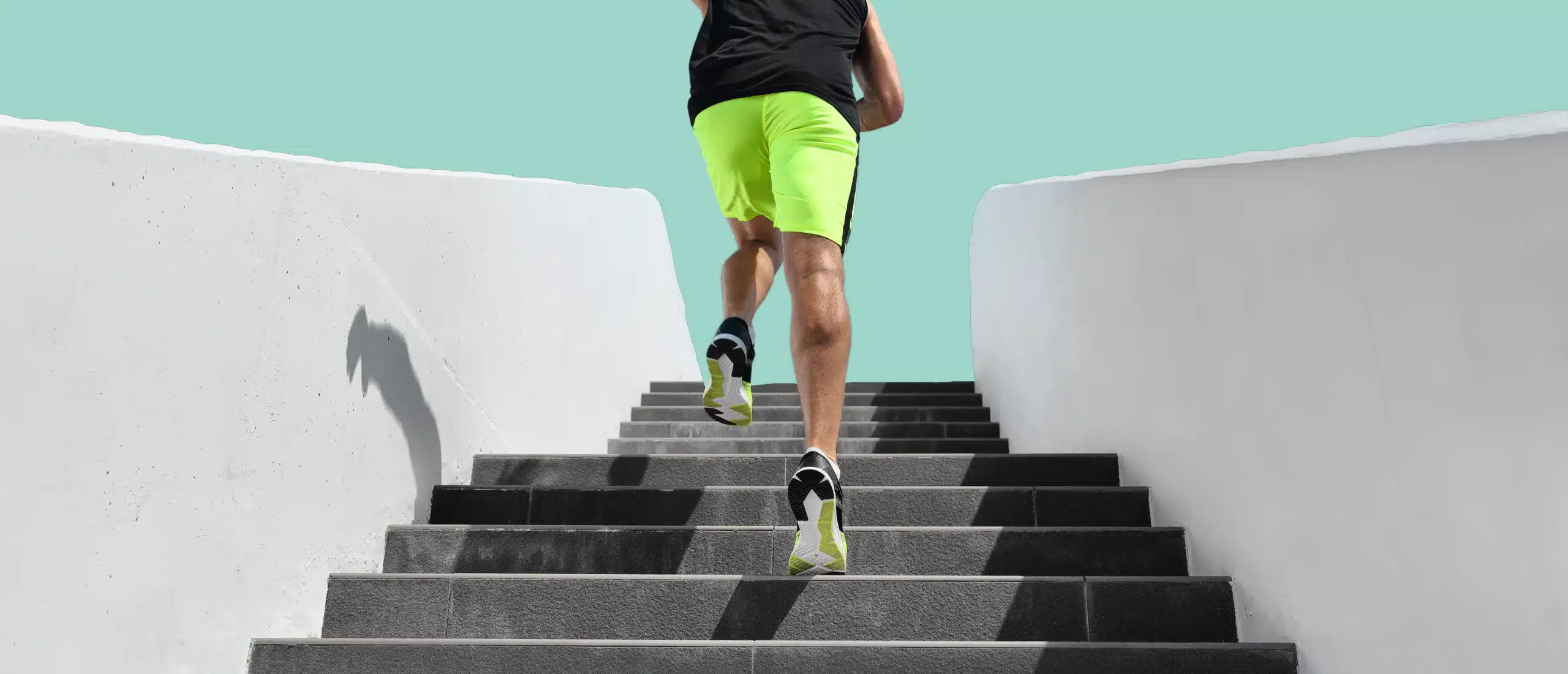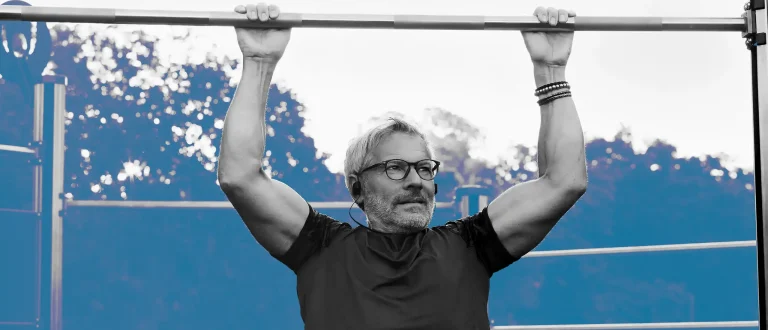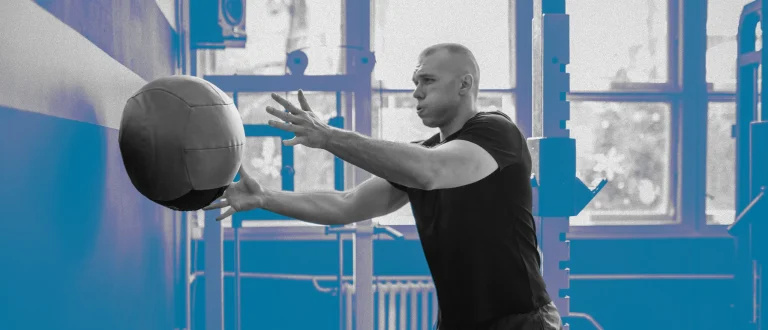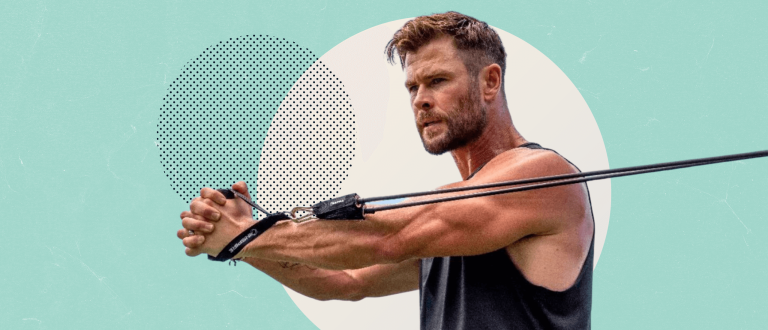This Simple Exercise Is One Reason People in the Blue Zones Live Longer
There’s nothing like taking the stairs to mess with your confidence. You can feel like you’re in the best shape you’ve ever been in—we’re talking cranking up the speed on the treadmill, and totally killing sprint sessions—then the second you’re faced with a single stairwell, you’re huffing and puffing like you’re ascending the stairway to heaven. Our personal experience can attest that taking the stairs can boost your fitness.
It turns out, climbing stairs might also help you live longer. According to the new Netflix documentary Live to 100: The Secrets of the Blue Zones, taking the stairs is one reason the people of Sardinia—a remote region of Italy—are extremely long-lived. Thanks to their two- to three-story houses, steep city streets, and rolling hills, Sardinian residents climb on average 30 flights of stairs a day (1).
But you don’t need to move to Italy to snag the health-boosting benefits of stair climbing (though, we’re in full support if you need a good excuse). Whether you hit the StairMaster, or swap the escalator for the stairs, here’s what you can expect from hiking up a flight or two every day.
Benefits of Stair Climbing
Lengthens lifespan
One study found that people who performed better while climbing four flights of stairs were less at risk of dying from any cause (2). Another found that people who climbed at least five flights of stairs per day had a lower risk of all-cause and cancer-specific mortality (3).
It also appears the more stairs you climb the lower your risk. A study that followed 8,874 men over a 12-year period found that men who climbed at least 35 floors per week were 16 percent less likely to die from any cause than those who climbed fewer than 10 floors weekly (4).
What’s more, stair climbing had more benefits than walking. Men who averaged eight flights of stairs a day had a 33 percent lower mortality rate than sedentary men, while those who walked an average of 1.3 miles a day had only a 22 percent lower risk.
Improves metabolic health
One of the biggest perks of hitting the stairs is its ability to upgrade metabolic health seemingly across the board. Stair climbing may protect against metabolic syndrome, according to a study published in BMC Public Health (5). Taking the stairs daily was associated with lower body weight, blood pressure, and risk of heart disease, stroke, and type 2 diabetes.
Boosts cardiovascular fitness
If thinking about taking the stairs gets you winded, there’s good reason. Climbing the stairs can improve your VO2 max, a metric widely known as the best indicator of cardiovascular endurance and aerobic performance. One study found that short bouts of stair climbing improved sedentary office workers’ predictive VO2 max by 9.4 percent in eight weeks (6).
Strengthens lower body
Climbing the stairs activates the big muscle groups of your lower body, including your quadriceps, hamstrings, glutes, calves, and adductors along with your core and arms provided you don’t hold onto the railing. Because they get your body working on multiple levels, they challenge your lower body strength in ways walking on even ground doesn’t.
Strengthens bones
Climbing the stairs is one of the best exercises you can do for bone health per the National Institutes of Health. Why? Climbing vertically requires you to work against gravity, which challenges your muscles and bones to work harder, which ultimately makes them stronger. Plus, climbing stairs can increase your heart rate as much as jogging or running on flat ground, while placing less impact on your bones and joints.
Improves stability and balance
Because taking the stairs requires balancing on one leg and changing levels all at once, your core, lower back, and small muscles in your ankles and hips will fight to keep you stable with each step. Overtime, climbing stairs can help you build stability and balance. One study noted that the ability to climb stairs well reduces the risk of falling, and can reduce the perceived strain of daily activities in older adults (7).
Burns loads of calories
Stair climbing is insanely efficient at burning calories. A study in Obesity found that stair climbing burns more calories than jogging (8). Exactly how many? The American Council on Exercise estimates that a 150-pound person can expect to burn about 272 calories for 30 minutes of stair climbing. If you have the stamina, that’s over 500 calories in an hour.
Even if you aren’t doing a structured stair climbing workout, climbing the stairs can still help contribute to “NEAT” (AKA non-exercise activity thermogenesis)—the calories you burn just going about daily activities like carrying the groceries and walking the dog. NEAT is an important contributor to overall calorie expenditure throughout the day. One study found that a low level of NEAT is associated with obesity (9).
Boosts energy and mood
Like any workout, stair climbing is good for an endorphin high. One study found that men who performed three one-minute stair-climbing intervals felt more energetic (10). And the more intense the stair climb intervals were, the bigger the mood boost. The researchers noted that heart-pounding workouts like taking the stairs may increase blood flow to the brain and activate certain brain regions related to cognitive performance.
References
1. Poulain, M. et al. (2013). The Blue Zones: Areas of Exceptional Longevity Around the World.
2. Peteiro, J. et al. (2020). Prediction of Cardiovascular, Cancer, and Non-Cardiovascular Non-Cancer Death by Exercise Echocardiography.
3. Sanchez-Lastra, M. et al. (2021). Stair Climbing and Mortality: A Prospective Cohort Study From the UK Biobank.
4. Rey-Lopez, J. et al. (2019). Associations of Self-Reported Stair Climbing With All-Cause and Cardiovascular Mortality: The Harvard Alumni Health Study.
5. Whittaker, A. et al. (2021). Daily Stair Climbing is Associated With Decreased Risk for Metabolic Syndrome.
6. Kennedy, R. et al. (2007). Evaluating the Effects of a Low Volume Stair Climbing Programme on Measures of Health-Related Fitness in Sedentary Office Workers.
7. Donath, L. et al. (2014). Effects of Stair-Climbing on Balance, Gait, Strength, Resting Heart Rate, and Submaximal Endurance in Healthy Seniors.
8. Eves, F. et al. (2012). A Workplace Intervention to Promote Stair Climbing: Greater Effects in the Overweight.
9. Chung, N. et al. (2018). Non-Exercise Activity Thermogenesis (NEAT): A Component of Total Daily Energy Expenditure.
10. Stenling, A. et al. (2019). Effects of a Brief Stair-Climbing Intervention on Cognitive Performance and Mood States in Healthy Young Adults.














